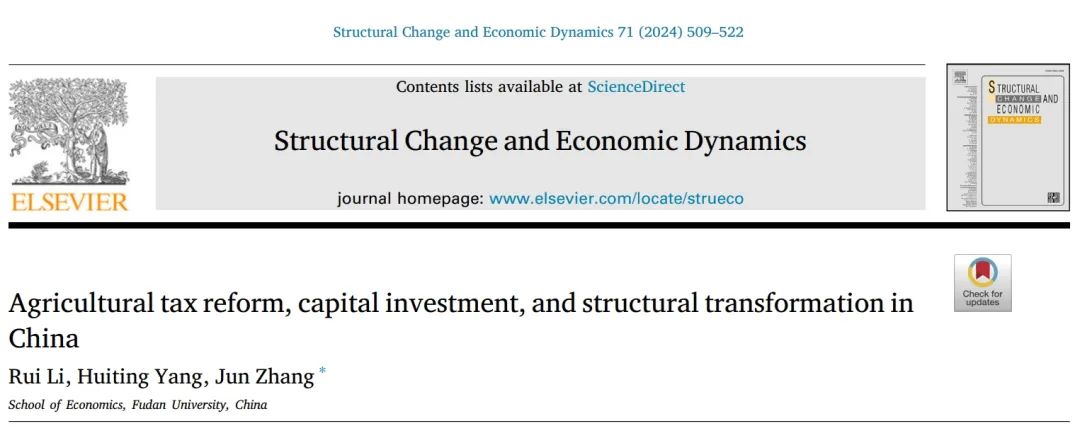
经济学院张军教授与其指导的博士生李睿,杨惠婷,近期在结构转型领域国际知名期刊Structural Change and Economic Dynamics发表研究论文。
Rui Li , Huiting Yang , Jun Zhang. Agricultural tax reform, capital investment, and structural transformation in China[J]. Structural Change and Economic Dynamics,Volume 71,December 2024, Pages 509-522
作者及单位:
李睿、杨惠婷、张军,复旦大学经济学院
内容简介摘要:识别结构转型的驱动因素对于理解经济发展至关重要。在21世纪初,中国经历了劳动力从农业部门向非农部门的快速转移。通常认为,这一转移主要归因于工业部门的“拉力”作用,而农业部门的“推力”则很少被关注。本文探究了结束两千多年农业税制度的农业税免征改革在促进中国劳动力跨部门配置中的作用。研究结果发现,农业税免征改革显著增加了非农部门劳动力的比例。机制分析表明,该改革鼓励了农民的资本投资并提高了农业生产率,从而促进了农业剩余劳动力的转移。进一步分析发现,改革引发的劳动力再配置效应显著增加了第二产业的就业和产出,但对第三产业的影响相对较小。
关键词:农业生产率,结构转型,农业税改革,资本投资
Abstract: Identifying the driving forces of structural transformation is crucial for understanding economic development. In the early 21st century, China experienced a rapid labor shift from agricultural to non-agricultural sectors. This shift is often attributed to the industrial sector’s ‘‘pull’’ force, while the agricultural sector’s ‘‘push’’ force remains less understood. This paper investigates the role of the Agricultural Tax Exemption (ATE) reform in promoting inter-sectoral labor reallocation in China, which ended over two millennia of agricultural taxation on farmers. Our results show that the introduction of the ATE reform contributed to a significant increase in the share of non-agricultural workers. Mechanism analysis reveals that this reform encouraged capital investment among farmers and improved agricultural productivity, consequently displacing surplus agricultural workers. Further analysis shows that the labor reallocation induced by the reform had significantly increased employment and output within the secondary sector, although its effect on the tertiary sector was relatively minimal.
Keywords: Agricultural productivity, Structural transformation, Agricultural tax reform, Capital investment
 返回顶部
返回顶部